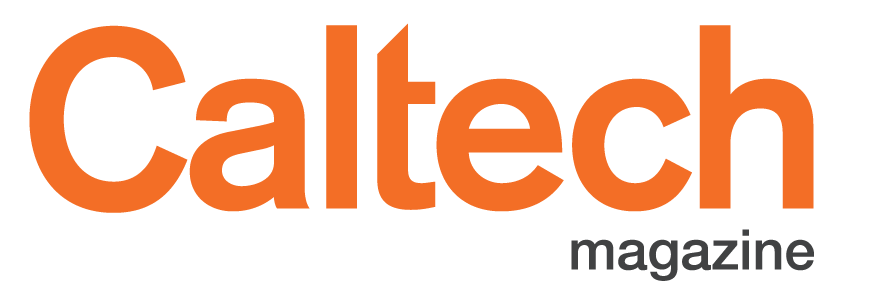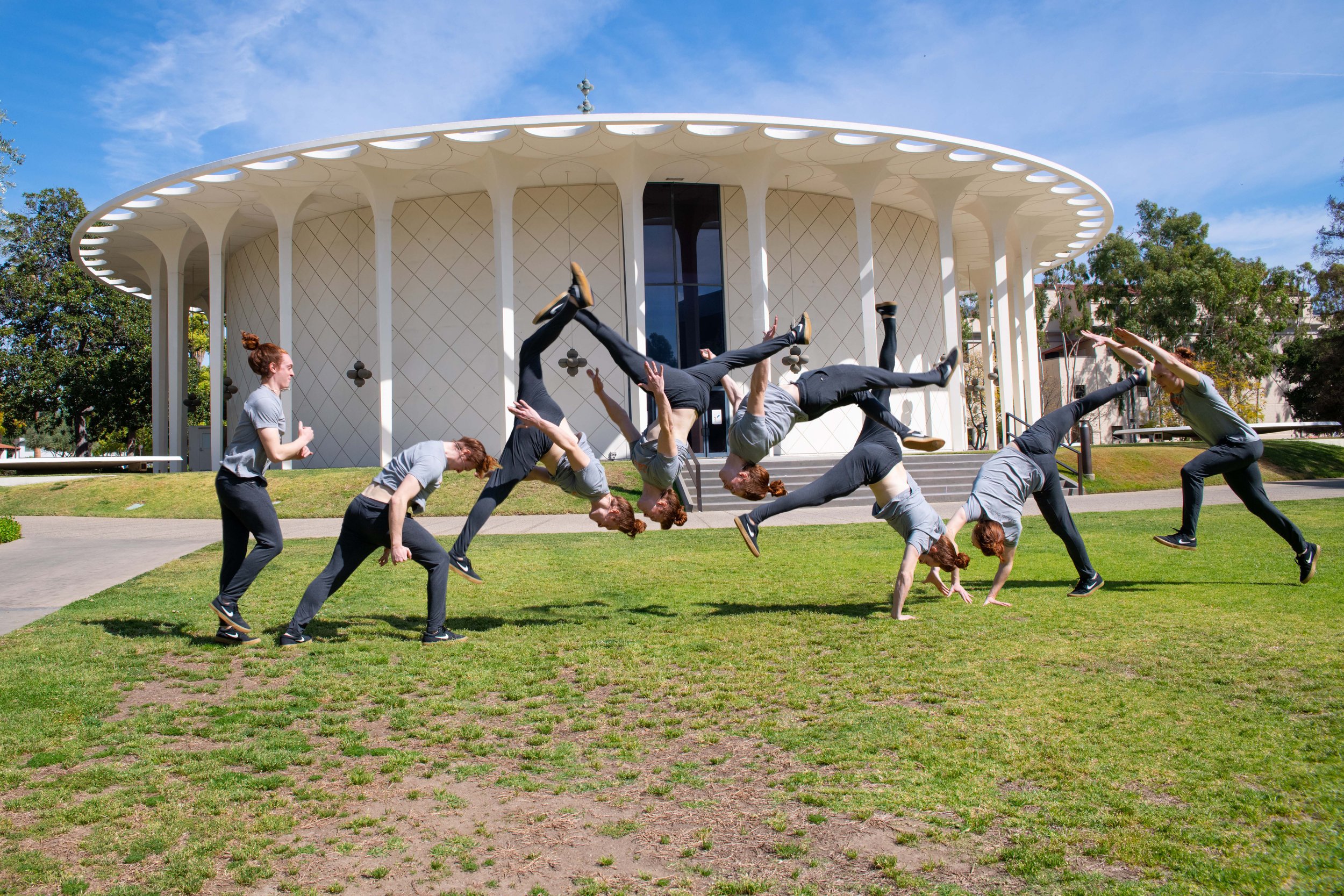Quantum's Hub: The Institute for Quantum Information and Matter (IQIM)
In quantum superposition, subatomic particles can act like waves and occupy many places at once—a little like how Caltech graduate student Piero Chiappina can be seen here performing every stage of a backflip at once. In reality, large, or macroscopic, objects like people cannot be in many places simultaneously, at least not without the help of photography. But researchers, including physicists like Chiappina, are working to scale up bizarre quantum effects such as superposition and entanglement so they can be used in quantum computers and other future technologies. Image: Lance Hayashida
BY OMAR SHAMOUT
In 1982, Caltech’s Richard Feynman predicted quantum computers would be not just possible but necessary. Classical computers could never simulate the seemingly infinite number of probabilities present in quantum systems due to the phenomenon known as superposition, which describes how particles such as electrons exist in two states at once. Such a leap would require quantum computing, which uses features of quantum mechanics to perform the kinds of computation not possible before.
When John Preskill, now the Richard P. Feynman Professor of Theoretical Physics, came to Caltech in 1983, he planned to continue his work in particle physics and quantum field theory. By the mid-1990s, however, Preskill had switched his focus to a field that owes its existence to ideas posed by Feynman, Nobel laureate and Caltech professor of physics, two decades earlier: quantum information theory. It was a career change that eventually led to the creation of what is now called the Institute for Quantum Information and Matter (IQIM), Caltech’s long-standing home for cutting-edge quantum research.
“[Peter] Shor had discovered that you could efficiently factor with quantum computers,” Preskill noted in an oral history for the American Institute of Physics (AIP) conducted by science historian David Zierler, who now serves as director of the Caltech Heritage Project. “I realized with the discovery of Shor's algorithm that it really meant there was a big difference between what problems we'd be able to solve and which ones we'd never be able to solve with computing technology because it's a quantum world instead of a classical one.”
Quantum information theory is the study of information processing on the quantum level. One of its primary aims is to guide the development of quantum computers, machines capable of far surpassing even classical supercomputers on certain problems of fundamental importance.
In the late 1990s, Preskill and H. J. “Jeff” Kimble, now the William L. Valentine Professor of Physics, Emeritus, received a grant from the Defense Advanced Research Projects Agency (DARPA), which was interested in quantum computing’s potential applications in cryptography. Preskill and Kimble then hired Alexei Kitaev, now the Ronald and Maxine Linde Professor of Theoretical Physics and Mathematics, as a yearlong visitor. Kitaev’s work on fault-tolerant quantum computers was a key advance in the field and subsequently won the 2012 Breakthrough Prize in Theoretical Physics.
Then, in 2000, Preskill and Kimble received a grant from the National Science Foundation, which they used to form the Institute for Quantum Information (IQI) that same year.
“NSF got a surge of funding for a program they called Information Technology Research, which included a lot of practical things but also sort of a lunatic fringe of blue-sky research. And that’s what we were part of,” Preskill told AIP. “We had an amazing group of young people in the early 2000s who came through, many of whom are leaders of research in quantum information now, like Patrick Hayden, and Guifré Vidal, and Frank Verstraete, and quite a few others.”
Vidal (postdoc ’01–’05), now a senior staff research scientist at Google, recalled those early days as a Caltech postdoc during a Heritage Project interview: “John had the vision ... to hire interesting young people for [IQI], then apply a hands-off approach. He’s not the type of person who needs to control everything and everyone.”
Dave Bacon (BS ’97), a former IQI postdoc, remembered IQI as a leading hub for quantum computing research:
“John literally started inviting everybody in the field to come visit. … It was like all of quantum computing was flowing through that place, and I was in the main place we'd have the group meetings,” he said in a Heritage Project interview. “It felt like everybody would come in and give a talk right outside my office. It was perfect.”
Liang Jiang (BS ’04), a former IQI postdoc and current professor at the University of Chicago, told Zierler during a Heritage Project interview that weekly meetings were so full of discussion and questions that Preskill had to impose a time limit: “You could only talk for one minute because some group members would get really excited with the results and would talk a lot about their research.”
By 2011, advances in quantum computing hardware, such as superconducting circuits and qubits (the quantum mechanical analogue of a classical bit) gave Preskill and Kimble the impetus to apply for more NSF funding as a means to broaden the IQI’s scope to include experimental work. They received that funding and, in 2011, changed its name to the Institute for Quantum Information and Matter, for which Preskill serves as the Allen V. C. Davis and Lenabelle Davis Leadership Chair of the Institute for Quantum Science and Technology.
Spiros Michalakis, staff researcher and manager of outreach at IQIM, described this name change in a recent Heritage Project interview as a “visionary move,” one that is still paying off: “We attach ‘M’—matter—and it really mattered because … we started to have conversations with how you can implement certain things and how you can convert some of the theories into experiments. … I didn’t know many physicists or many people who were part of physics or even mathematical physics … who were not, basically, in one way or another, associated with IQIM. … If you look at the roster, even now, for the second iteration of IQIM, the second cycle we have, there’s a pretty cool medley of people.”
As a sign of quantum computing’s progression at Caltech and beyond, the Institute partnered with Amazon to build the AWS Center for Quantum Computing, which opened on campus last year. The goal of the collaboration is to create quantum computers and related technologies that have the potential to revolutionize data security, machine learning, medicine development, sustainability practices, and more.
“It is wonderful to see many of the graduate students and postdocs from the early days of IQIM come back to campus as senior research scientists at the AWS Center for Quantum Computing,” Michalakis says. “IQIM brought together theorists and experimentalists with a vision toward a transformative future for all. Amazingly, we are reaping the benefits of that vision already, as the era of quantum information science and engineering unfolds before our eyes at an unprecedented pace. What an exciting time to be alive.”

